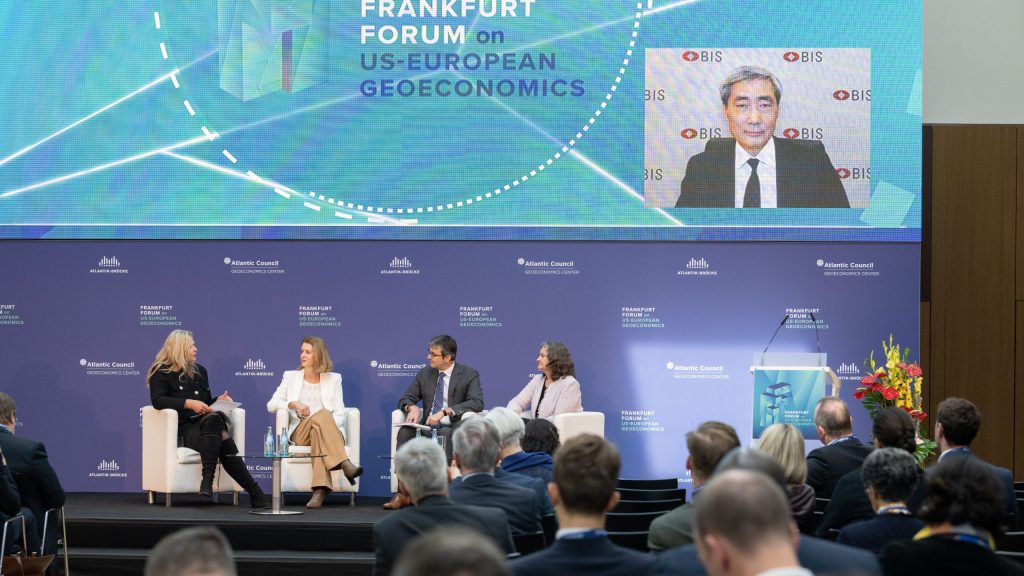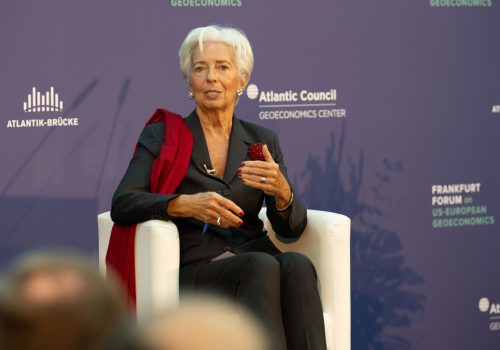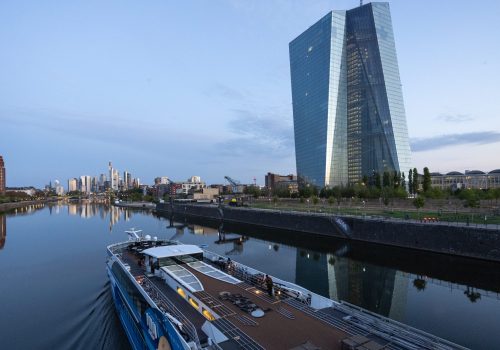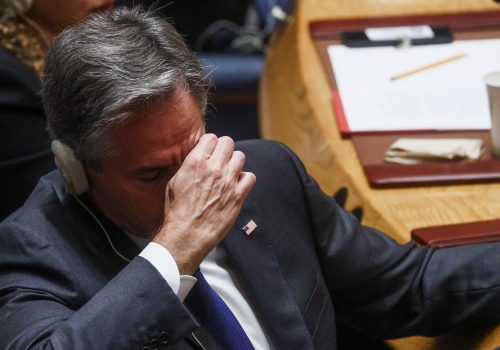As leading economic policymakers, experts, and academics from both sides of the Atlantic gathered in Frankfurt, Germany, on Wednesday, it was news from Brussels that sent a jolt through the room. The newest European Commission sanctions package—the eighth since Russia’s invasion of Ukraine—will include price caps on Russian oil, in line with recent commitments from the Group of Seven (G7).
The hotly debated move showed once again how the economic relationship between the United States and the European Union (EU) has evolved this year, from one focused on overcoming differences on trade and regulations to one centered on security and geopolitics. “In an increasingly multipolar world, the EU and US must continue to work together every day—and not just in times of crisis—to show that liberal democracies can deliver sustainable and inclusive growth,” said European Commissioner for Economy Paolo Gentiloni. “And this is happening.”
Gentiloni’s keynote address capped the first Atlantic Council and Atlantik-Brücke Frankfurt Forum on US-European GeoEconomics. The daylong forum showed that while the United States and EU approach some challenges differently, Russian aggression has provided a renewed sense of purpose and urgency to resolve those differences. Here are more highlights from the event:
Are Russia sanctions working?
- Daleep Singh, a former deputy national security adviser in the White House who helped devise the sanctions response to Russia’s invasion this year, said the success of those sanctions should be judged by the answer to the question: “What is going to be Russia’s ability to project influence and power in the world?” Singh argued that economically, technologically, and militarily, “Russia will emerge from this invasion considerably weaker and less relevant.”
- Still, the war continues, with Russian President Vladimir Putin escalating in response to a recent Ukrainian counteroffensive. But Julia Friedlander—CEO of Atlantik-Brücke, nonresident senior fellow at the Atlantic Council, and a former sanctions policy official at the US Treasury Department—pointed to the “time lag” for sanctions to bite. The rush to the “top of the escalation ladder” by blocking Russia’s access to foreign exchange reserves didn’t immediately shut down Moscow’s war machine. But seven months in, sanctions have helped create “an outcome which might lead to negotiation, could even lead to something that Ukraine could consider to be a victory.”
- Carla Norrlöf, senior fellow at the Atlantic Council and professor of political science at the University of Toronto, presented her research on whether sanctions use could dilute the power of Western reserve currencies. She warned against “coming down too hard” on countries like Brazil, India, South Africa, and Argentina for not joining Russia sanctions. “They just don’t sanction a lot,” she said. “So to ask them to participate in this mega-sanctioning enterprise is a lot.”
- The economic response to Russia’s invasion has raised questions about what would happen if China moved aggressively against Taiwan. “China is so plugged into the global economy that… to try to sanction China in the same way as Russia I think is a no-go,” Norrlöf said. But Singh countered: “There’s no country that’s too big to sanction.”
Testing the trade winds
- In a break from past US approaches, the Biden administration has avoided tackling tariff barriers and seeking new market access for US businesses as part of its trade policy, said Clete Willems, an Atlantic Council senior fellow who served as deputy director of the National Economic Council in the Trump White House. During a panel on trade, Willems presented new research arguing that the Biden administration should “raise [its] ambition” on bringing down tariffs from the EU to Asia.
- Elizabeth Baltzan, senior advisor to the United States Trade Representative, countered that “market access” doesn’t just refer to tariffs. The EU Trade and Technology Council and Indo-Pacific Economic tackle market access, she said, because “in agriculture, non-tariff barriers are more of an issue for small agricultural companies than the tariff barriers because it’s binary: You either access that market or you don’t.”
- Rupert Schlegelmilch, the European Commission’s acting deputy director-general for trade, agreed with Baltzan, saying: “The fragmentation of regulations is the new tariff.”
- The Biden administration has also lately pushed for “friend-shoring,” or moving supply chains away from geopolitical adversaries. But Kenneth Kang, deputy director for strategy, policy, and review at the International Monetary Fund (IMF), said such moves will not pay off. “The tendency to re-shore or friend-shore will only worsen diversification,” he said. “It will make countries more susceptible to such supply shocks and raise the overall cost of production.”
Inflated expectations
- After European Central Bank President Christine Lagarde opened the forum with a vow to continue raising interest rates to tame inflation, a panel of monetary-policy experts analyzed her policy promise, with Philippa Sigl-Glöckner—founder of the German think tank Dezernat Zukunft—saying she disagreed with rate hikes even though they probably won’t be catastrophic.
- Europe’s inflation, she pointed out, is driven by energy costs. Her answer for getting the energy-price shock? “We need to invest,” Sigl-Glöckner said. “We need to get rid of fossil [fuels]. And what we’re doing right now [with rate hikes] is making capital costs more expensive.”
- Lagarde also cited the research of former IMF senior official Martin Mühleisen, now an Atlantic Council senior fellow, who argues that the dollar and euro will be difficult to replace as world reserve currencies—so long as the United States and EU are closely aligned and maintain a strong global security presence.
- But what about the Chinese renmibi? Andreas Dombret, former member of the Deutsche Bundesbank executive board, said the currency “is likely to gain in stature” for several reasons, including the new importance of China’s globally systemic big banks and Beijing’s status as the world’s biggest cross-border lender in US dollars. If China were to start lending in renminbi, Dombret said, that could shift the reserve currency balance quickly.
- To keep the dollar and euro on top, said Geoffrey Okamoto, the former first deputy managing director of the IMF, “fiscal discipline” is in order. He also recommended the disciplined use of sanctions: “You can take antibiotics the first time and it’s quite potent, but the more you take them, the less effective they can be over time.”
The race for a digital currency
- As the Atlantic Council’s central bank digital currency (CBDC) tracker shows, the United States is in the research phase for a digital dollar, while a digital euro is in development. Still, said Evelien Witlox, program director for the digital euro project at the European Central Bank, a digital euro remains years away—if it happens at all.
- Brent Neiman, counselor to the US Treasury secretary, said CBDCs could “dramatically improve” remittances and other cross-border payments by reducing fees and friction. But those benefits must be balanced against risks such as consumer privacy and money laundering concerns, which will require policymakers to “build up a regulatory perimeter and framework and structure.”
- Neiman said that will require the United States and EU to be trendsetters, as new Atlantic Council research argues that both must work together to ensure privacy and transparency standards are met in this burgeoning field.
- Witlox added that a CBDC will help ensure consumers still have access to central bank money in a cashless age: “We believe that this availability gives trust to the full system.”
Daniel Malloy is the deputy managing editor at the Atlantic Council.
Charles Lichfield is the deputy director of the GeoEconomics Center.
Further reading
Wed, Sep 28, 2022
ECB chief Christine Lagarde: ‘Our primary objective is price stability’
New Atlanticist By
Europe's top banker shares her thoughts on the inflation crisis and much more during the Atlantic Council's Frankfurt Forum.
Tue, Sep 27, 2022
From sanctions to digital currencies, here’s a new transatlantic agenda for economic coordination
New Atlanticist By Charles Lichfield
At our Frankfurt Forum on US-EU GeoEconomics, the Council's original research lays out a long-term strategy for economic coordination in a world reshaped by Russia's invasion of Ukraine.
Thu, Sep 22, 2022
Multilateralism needs an overhaul. Here’s where to start.
New Atlanticist By Yomna Gaafar
The world is growing more volatile by the day—but leaders are acting within a system ill-equipped to handle the moment.
Image: Participants speaking during a panel at the Frankfurt Forum in Frankfurt, Germany, on September 28, 2022. Photo by Stefan Krutsch



